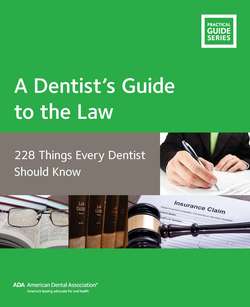Читать книгу A Dentist’s Guide to the Law - American Dental Association - Страница 28
На сайте Литреса книга снята с продажи.
14. What Are the Advantages and Disadvantages of a Sole Proprietorship?
ОглавлениеA sole proprietorship is the simplest and most common structure chosen to start a business. It is an unincorporated business owned and run by the dentist with no distinction between the business and the owner-dentist. The dentist is entitled to all profits and is responsible for all business’s debts, losses and liabilities. This low maintenance business structure costs almost nothing to create and is relatively easy to establish.
Because the dentist and the dentist’s business are one and the same, the business itself is not taxed separately — the sole proprietorship income is your income. The dentist reports income or losses and expenses with a Schedule C and the standard Form 1040. Because the dentist is the sole owner of the business, the dentist has complete control over all decisions — he or she isn’t required to consult with anyone else when the dentist needs to make decisions or wants to make changes.
Because there is no legal separation between the dentist and the dentist’s business, the dentist can be held personally liable for the debts and obligations of the business. This risk extends to any liabilities incurred as a result of employee actions. Note, however, that the dentist will remain liable for professional malpractice individually regardless of business structure.
Furthermore, a prudent dentist will purchase a reasonable amount of professional liability insurance to afford protection (covering legal defense costs as well as any settlement or judgment amounts) from malpractice lawsuits. A sole proprietorship will not afford protection against non-professional liabilities, such as the patient who slips and is injured in the waiting room. A business format such as a corporation will help protect the dentist’s personal assets from these non-professional liabilities, but will not protect assets that are part of the practice. To protect practice assets, other types of insurance such as general liability coverage should be considered in these litigious times. However, insurance can be expensive, deductibles and co-pays apply, and potential sources of liability keep expanding. As a dentist starts to accumulate more personal assets outside the practice and the practice itself grows, liability issues become more important and may lead the dentist to conclude that he or she has outgrown the sole proprietorship format. Some other factors that influence the business format decision will be discussed in the subsequent sections.
